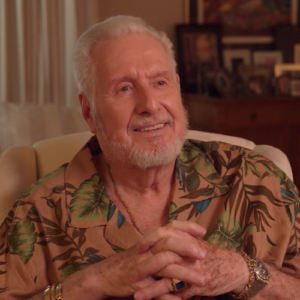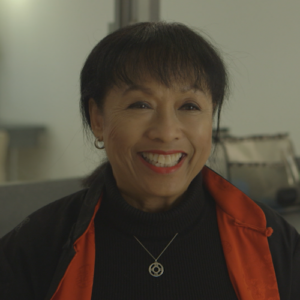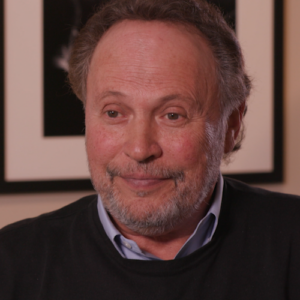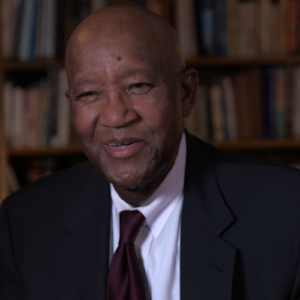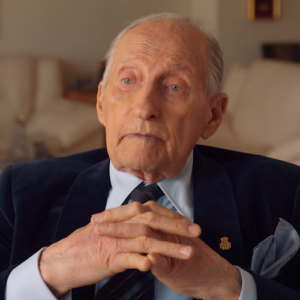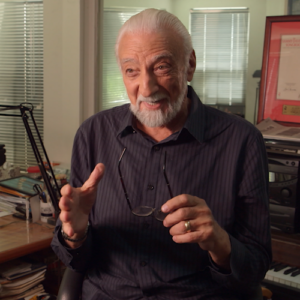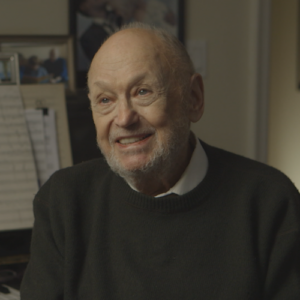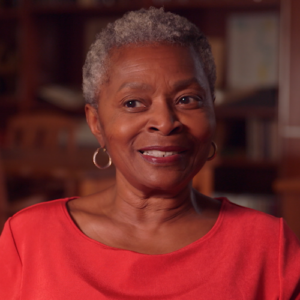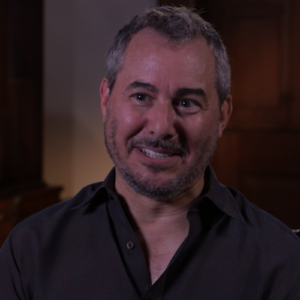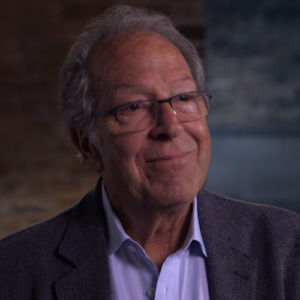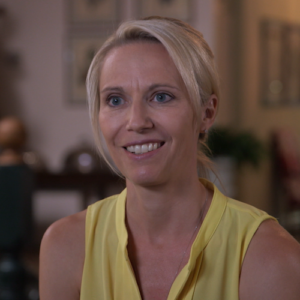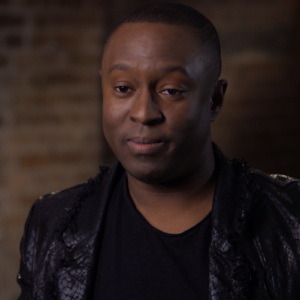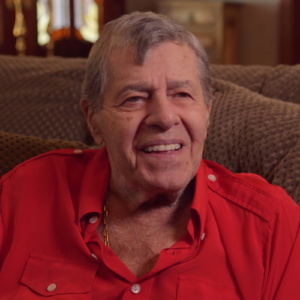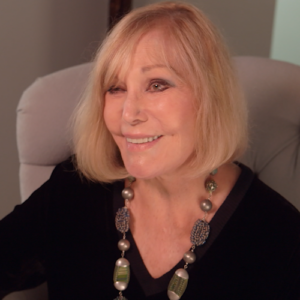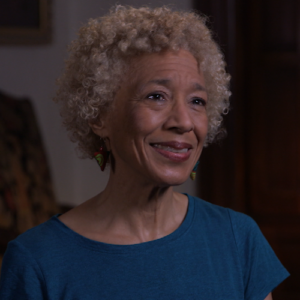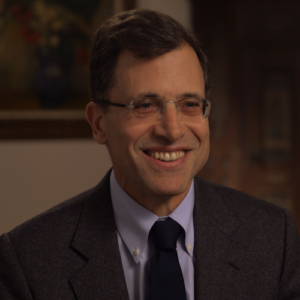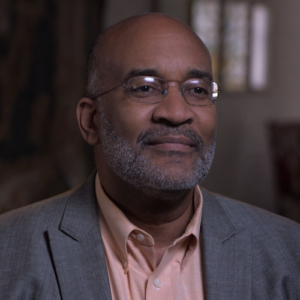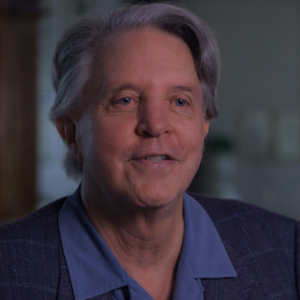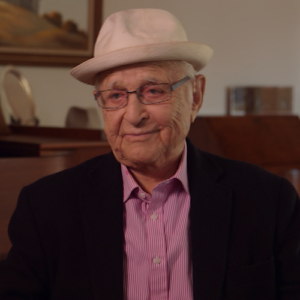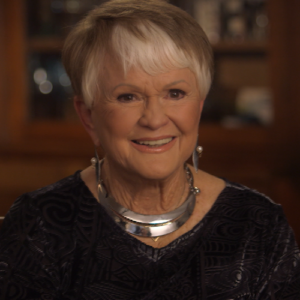Chita Rivera: I am Chita Rivera. Actually, I’m Dolores Conchita Figueroa. Rivera. But my name that most people know is Chita Rivera.
Interviewer: I love the full name.
Chita Rivera: Yeah? Yeah.
Interviewer: Who was Sammy? Who was Sammy Davis Jr?
Chita Rivera: Oh, Sammy was, I think, the greatest entertainer that we’ve ever, ever had. I don’t think that anybody could think of replacing him. I can I tell a little story? Because I was a snob. I was a horrible, embarrassing snob. I had done several shows. And so Mr. Wonderful came up and and they said, Would you like to do it? And I said, But it’s with Sammy Davis Jr. He’s a nightclub performer. And what’s he doing on Broadway? I mean, he doesn’t belong. I had not seen Sammy. But even if I had, I don’t know, I could still, because I’m from the ballet school Bat Valley world. And, you know, at then that time really close to it. And and so I was I was actually looking down my nose at Sammy. This is a confession, I want to tell you. Yeah, I should have had a beating. And so we started rehearsals and I, you know, a dog goes and I went, Ooh, ooh, ooh. And it came to run through and to previews. And I realized what I was, who I was in the, in the company of one of the greatest I never saw anything like because the second half of the show was his club act. The first act was all good. James and Jack Carter was the story. And when we came to the second act, we were all sitting like we were in a nightclub. And he did his thing. So not only was he brilliant in the acting department in the first half of the show, and he sang, of course, and danced a little bit, but when he hit that second half and he and his uncle and his dad, they were all some of the Royal Marsden Trio. They were also and I, I just shrunk. I was so embarrassed of myself because I was in the company of truly a great, great performer.
Interviewer: You’re one of the greatest dancers in Broadway history. Let’s talk technique. What did you think of Sammy’s technique and everything?
Chita Rivera: Well, he was God said, this is going to be I’m going to give the world somebody really special. And he plopped down Sammy Davis Jr. Now, Sammy instinctively, and he was a fabulous copycat in that he loved Bob Fosse. So and he loved Bob Fosse, his style. So he made it his own. But it was Fosse’s style, and he had it to the tee better than most dancers could even do it. So his he had it sort of a technique of his own. It came from his heart. It came from his soul. That’s what most of us can’t do. We have to have a singing teacher to give us things to do, to put our voices in the right place. And he was a child of the world. You know, he learned it from experience, from doing it. And because he had to do it, there was nothing else he could do. He probably picked up that doggone trumpet and just played it. You know what I mean? It wasn’t. He got behind the drums and beat the heck out of them. Yeah. So his technique, it’s the purest form, but not all of us are graced with that.
Interviewer: Did you get a sense of how Sammy grew up in the forties?
Chita Rivera: I got a sense. A sense. And that’s the right word that it was hard. This was a little tiny guy who was at the at that time, too, that was gifted and could maybe have been a threat. Who knows? And Sam Senior and Will Mastin, his his uncle and Sammy probably had to go through some pretty horrible things in the South. And still they came through. I met I met his mother and really liked her a lot. But I don’t know about the family, you know, foundation. I don’t know about any of that. I do know that Sammy worked some of. Very young child. I don’t know how he got his schooling, where he got a schooling or anything like that, but that was the you know, we all we all live in different ways. We all grow in different ways and at different times. And we get our education in many different ways. I have always said that street sense is common. Sense is probably the better sense that you should have the the the education of the streets, the education of being with people, I think now is one of our biggest problems, is that we don’t know enough about other people’s cultures or experiences of other people. We care kind of selfish that way. So I think Sami got his a lot of his education doing it.
Interviewer: What was his mother like?
Chita Rivera: Well, I only Sami’s mother was extremely warm to me. Very kind to me. He he seemed to have loved his mother quite a bit. I think she was at the time that I saw her, she was terribly proud of her son. He was Sammy Davis Junior when I saw him. And so she, with a high chest, would walk into a room or the theater, and there was pride. We miss my I loved Wil Marsden. He was he seemed to be the strong, secure, older gentleman that if anything went wrong, you’d probably run into Wil and say, What do you think? They were sort of like my family because Sammy and I dated for quite a while, and so I was a little closer to Wil and Sam Senior. So Wil was like a reliable old uncle, you know, that was there. I I’m not so sure how how many taps came out of those shoes, you know, but the showmanship was was phenomenal. I can’t remember or I don’t see anything like it today.
Interviewer: You mentioned it at one point. Did you and Sammy become romantically involved with Sammy?
Chita Rivera: And I became involved. Romantically involved. I I guess it was sort of like, I don’t know, three or four months into the show. I’m not really sure. It’s I’m sure it’s a long time ago. But I adore him, absolutely adored him. And he the two of us together were were terrific. As a matter of fact, he used to tease my daughter, Lisa, saying, you know, you could have been mine, you could have been mine. She’ll like that, because she absolutely loved and adored Sammy and still does to this day. We have a wonderful picture of Sammy and myself and some on some occasion before he passed. And I’m actually kissing his hand. And it’s a delicious picture. Lisa likes that picture.
Interviewer: What is some of the typical New York things you to do together?
Chita Rivera: Well, we all take time off. We we didn’t have time off. It was a very the show was very successful, as it should have been. Good music was duly signed to and Sammy would always get a group of kids up to his apartment. And so we would hang out and his apartment. And those were the wonderful days where you were very social, you know, you know, you you talked to each other, you laughed with each other, you drank with each other. There were no secrets. You were just wonderful friends. I miss those days desperately. So after the show, we always went up to Sammy’s house apartment.
Interviewer: Sammy’s extravagance was legendary. When you were dating, does he did he, by your presence.
Chita Rivera: Mean when Sammy and I were dating, he must have bought me presents. I’m not a person that I bought a diamond. Diamond rings and diamond earrings and stuff. No, no, I don’t need that stuff. I knew it. Sammy was constantly giving to a point where. I used to worry was he giving to be appreciated? You know, But he was he was he was just an extremely caring guy who showed his affection and his love by wanting to give people sweaters and suits. And and I’m sure he gave a lot of jewelry. I don’t remember, you know, great rings and stuff like that. But I’m a dancer. We don’t put too much into that. All that stuff or forever taken it off, you know?
Interviewer: But how did it end?
Chita Rivera: I think I went off and did a show. I think it was a similar and I met my also. Mr. Wonderful was before. Oh, you’re bringing back all of this stuff. I’m savvy. I ended I think around the time that I did West Side because we must have done Mr. Wonderful before West Side Story. And I met my future husband, Tony Moore, Dante, who is the father of my daughter Liza. And and we fell madly in love. It’s as simple as that. And then Tony became friends with Sammy. And so it was just weren’t a happy family.
Interviewer: How do you what are your favorite memories of Mr. Wonderful?
Chita Rivera: First of all, my memories of Mr. Wonderful are very soothing because it was a great show introducing one of the greatest performers in the entire world. And I loved Pat Marshall. She was wonderful. I love Jack Carter. He was terribly funny. Judy Stein’s music. It was a superb show with a wonderful cast. Also, the dancing was great. The singing was great. It was a very satisfying time as far as friendships and as far as pride in your work and to be led by Sammy Davis Jr at the helm. You can’t get better than that because if anybody, you never missed a show. Of course you couldn’t because the one. But he never did and he gave 500%. Each show.
Interviewer: How was it? How was the show received?
Chita Rivera: To my knowledge, right now, I don’t think I changed stories. It was a hit. It was a huge hit because Sammy had the nightclub people and then he gained the theater audiences.
Interviewer: And just for our viewers who may not have ever gone to a nightclub in the fifties.
Chita Rivera: It’s true.
Interviewer: The nightclub was like what? That experience?
Chita Rivera: Well, the nightclub was a much more relaxed scene. They served alcohol. You in the theater, you have a script, you have a story, you stick by it. You have to you have to do the same thing every night to your fellow performers. It’s structured. Nightclubs are not as structured, especially for people like Sammy and Dean Martin and that whole group. That too, that was so brilliant, Frank Sinatra and all of them. But it was far more relaxed. And you can be relaxed. And, you know, we’re going to see one specific person and and they give it to you. What was that? Nightclubs are looser, much looser. They were amazing. I mean, I’ve been lucky enough to know that Dizzy Gillespie and all of these great, great people that you go to nightclubs to see, you know.
Interviewer: Was it a challenge for Sammy making that transition from nightclub performer to Broadway?
Chita Rivera: I can’t speak for him for his heart or soul, but he seemed like he just got up there and did it. You know, I don’t know. Of course, it was a challenge to some degree, because he had never been in the theater before. And I’m sure Sammy liked these challenges. He wanted to he wanted he had to be Sammy had to be the greatest. Whether he knew it or not, I think he was driven by this gift that God gave him.
Interviewer: And what was the climate in 1956 for a musical with a black leading man?
Chita Rivera: The climate. The climate for a black man in the theater at that time, being Puerto Rican, I didn’t think about it. And we never had any feelings of anything else but people screaming and yelling and loving Sammy. What Sammy went through personally, I don’t know, but I’m sure he Stein, Woodward, Sammy, they all got together and said, Oh, my God, he’s interested. Let’s bow at his feet. So I can’t speak for I know the theaters were full, so clearly the climate was pretty good.
Interviewer: Years later, you guys were in a film together, sweet charity scenes.
Chita Rivera: No, I didn’t do. I was Sammy and I did do Sweet Charity together, a fun, wonderful movie. And Sammy was just perfect for that part. You know, I mean, you can’t think of anybody else, even though my great friend Ben Vereen has done it also. But that’s what Sammy, you know, he was amazing and he brought to it only what he can bring and that’s that Sammy. We had a we had a great time together. You know, I was I had a lot more to do. So we there was a lot of time spent. But I was I always went up to the house. We always we became we stayed friends for forever and. Fortunately, Lisa and myself were two of the few people that were allowed to come up to the house during his last days. So that in itself is is proof of his love for. For us.
Interviewer: What makes everyone love it?
Chita Rivera: That’s really a clever question. What makes Sammy run? God, his spirit, his drive. He had to. There wasn’t Sammy. So Sammy didn’t walk. He ran. He ran because. Because Sammy was a completely unselfish performer. He wanted to give the audience. He wanted them to have a good time to enjoy it. I’m sure he had his ethnic background in the back of his head somewhere because his pride was was tremendous. But Sammy loved people and wanted to be accepted, as we all do. And wasn’t afraid to show it. You know, So he gave us meat, potatoes, fruit. He gave us the whole meal. Dances described things in a strange way.
Interviewer: Mr. Bojangles became one of his signature songs. He was reluctant to embrace that initially. Oh, yeah, I heard that. What about that song reflects the fears of advancing.
Chita Rivera: The fears of the dancer? I don’t think a dancer would have fear of that song. Typically, a Fosse’s style and own was most definitely. That Sammy loved Bob Fosse. Sammy loved dancers. And when he did it, I just couldn’t believe that it was so perfect. I think he brought out Bob Fosse his style, even more so than a stage full of fussy dancers because he was so specific about Bobby’s work. And he would only do his very best. He would not do it if he felt he couldn’t. And it was perfect. I mean, that that bowler hat, that blackness of the whole thing. It was style. It was. It was jazz, you know? It was fabulous. That’s a good book style jazz and fabulous.
Interviewer: Here’s a quote from Sammy.
Chita Rivera: Oops.
Interviewer: They’ll like me even if they hate my guts.
Chita Rivera: Hey.
Interviewer: How did that play out? How to feed his desire to be appreciated.
Chita Rivera: How did they like me?
Interviewer: If they’ll like.
Chita Rivera: Me, even if they hate my guts? And you’re asking how it played out.
Interviewer: In his life.
Chita Rivera: In his life? He approached. Yeah. They’ll like me. Yeah. I’m going to prove to them. Even though they may not like the color of my skin, even though they may not like the fact that I am not seven, six feet tall, even though I have one, I. I’m going to make them see what I really am and get past all of that other crazy, insane stuff.
Interviewer: A follow up to that. He also said he claimed that he was afraid that all he had was his talent. I don’t deserve this. Why me? I don’t deserve all this. Why me?
Chita Rivera: I think when when when a person says I don’t deserve all of the things that come to them, you know, people glorifying them and saying they’re brilliant. I think a true a true artist, a true spirit. Wonders why? Because there’s so many other wonderful people in the world. Why me? I think you just have to give that up and trust the fact that God has pinpointed you. And you just have to say thank you. Because I feel that way myself. I think most artists do. Michael Jackson felt that way. These are brilliant geniuses that are chosen, and it might even be more than they can take themselves. I think that’s all right. I think that’s the spirit that’s so much bigger than the body. I think that’s the spirit inside of this container that keeps it down. I think that’s the spirit. Yeah, That’s the body saying why? Why me? That’s where we are now. Do I sound bookable?
Interviewer: That sounds great. So the title of the show is I Got to Be Me. I impression of Sammy as he was many mes. So I want to play a word association game. It just whatever comes to mind.
Chita Rivera: Just respond quickly, okay?
Interviewer: Impressions is what I’m looking for.
Chita Rivera: Prodigy He was a project prodigy. Cooper The best. Impressionist at that time the best. And there is no time now. Nobody does it anymore. So he was on the nose. So you want one word? Perfect. Singer Well, I’m going to sound boring because Sammy could do everything with his voice. He was a great singer. Great. All right, let’s say great survivor. Absolutely. An actor himself.
Interviewer: Activist.
Chita Rivera: True.
Interviewer: Hipster.
Chita Rivera: Yeah.
Interviewer: Hipster patriot.
Chita Rivera: Absolutely.
Interviewer: Legend.
Chita Rivera: He’s. Out of ten. Ten out of 100. 100.
Interviewer: Was there a sense when Mr. Wonderful was happening it was time for him to move on and go solo? Is there some tension about that?
Chita Rivera: If there was tension, it was at that hotel. They did not bring or in their dressing room. I do not remember. I mean, it was clear to us that he didn’t need anyone else. It was clear to us that that his dad was there for the style and the whole trio was a family thing. So that in itself is a is attractive and attractive to people. I just thought that. And his and his uncle. You know, like I said, I don’t know how many taps came out of those feet. You know, he was an older man, so it was a very stylish looking trio. But Sammy didn’t need them.
Interviewer: But he was very loyal.
Chita Rivera: Extremely loyal, extremely loyal to us, to his father and his uncle. I mean, what are you going to do?
Interviewer: The question is you were one of a number of.
Interviewer: Oh, sorry. Stay there.
Chita Rivera: Oh, yeah.
Interviewer: There were a number of amazingly beautiful women that Sammy dated and married and so on. What do you think his essential.
Chita Rivera: Allure for Cheetah Sammy’s attractive ness was Sammy. His person, his talent. His talent blew me away. His sense of humor. Because humor is vital in my life. His sense of humor was. It was something that I couldn’t do without. You know, at that time. And because he could dance so well and he was sweet and he was giving he was a swell person to be with. I don’t like the other stuff. I like positive, good people who give. And that’s what he did. And it satisfied me. And we we we were terrific on those levels. We agreed. And and and the fact that we were every night going up to the apartment and also with the nightclub thing, I don’t remember going to an awful lot of nightclubs with him because I have the mentality of a dancer, particularly in those days. So I wasn’t too much of a nightclub girl, you know. But he was he was attractive on on all levels. And if you’re looking for John Wayne, you’re looking for a name. You know, I wasn’t looking for a name. I was looking for a special soul. And that’s what he was. I don’t want to miss them if they come my way. I want to. I want to look them in the eye. And Sammy was one of those.
Interviewer: How did he manage to burn the candle at both ends?
Chita Rivera: Because he didn’t want to miss out. He burned the candle at both ends, I guess, because he didn’t want to miss out on anything. I understand what that is, too. And he could. He could burn it. You know, So I guess Sammy went as far as he could go. But during our time, it was not quite as wild as what I heard went on later on, you know, in Vegas and whatever. Cause he did Golden Boy, I think, after us. And so his life just went in different directions. But during Mr. Wonderful, it was a bit more contained.
Interviewer: Well, one last point is the Mr. Wonderful is about a year and a half after his car accident. In your time working with him, was that something that you felt he consciously had to make adjustments for?
Chita Rivera: No, except I think one night. And I hope this doesn’t sound you. Pardon me too crude, but one night we must have had some words which I don’t remember ever having with him. But I remember he took his eye out. And I, you know, through the years, you wonder, have I made these stories up, which I don’t, but the words that are in my head are. Is this what you want? Now, that sounds like an hour interview in itself. I know how dramatic that sounds, but I do remember that. And I’m not even sure that we were alone.


